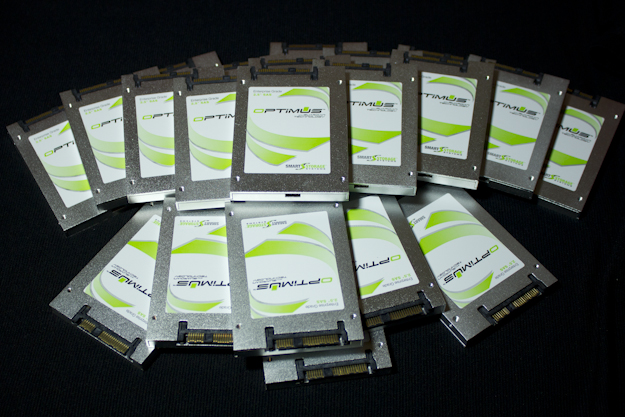REPORT ANALYSIS AND CONCLUSION
We have to admit, these are the types of reviews we love doing. This entire process just screamed “MORE”. More drives, more RAID adapters, more speed, more of everything. Luckily for us, the Adaptec ASR-72405 and the SMART Optimus SSDs came through with outstanding performance.
With the SMART Optimus, we knew what were getting into. It was like rediscovering an old friend (if old friends are enterprise SSDs). We loved the drive when we reviewed it in 2012 and nothing over the past few weeks did anything to change that opinion. The level of consistency these drives offer is outstanding.
The Adaptec ASR-72405 was a completely different story. The previous Series 6 adapters were showing their age, especially when compared to the competition. But, with Series 7, Adaptec made some very bold claims and even bolder moves. We commend Adaptec for bucking the 8-port ROC trend and unleashing the 24-port PM8015 ROC. By enabling 24 native ports, Adaptec is able to bypass the expanders required for traditional, large drive count systems. Adaptec was also first to market with the use of min-SAS HD connectors and cabling. This allows Adaptec to double the port count in LP MD2 PCIe slots that are so prevalent in the server market.
Every time you look at the ASR-72405, you are reminded of the ground-up effort that was put into this product after the Adaptec/PMC-Sierra acquisition. It seems very purpose built, with a clear product positioning strategy. This is clearly a shot across the bow of LSI. If you weren’t convinced of that, take a look at all of their product comparisons. You may notice some familiar results under “Competing 8-port adapter”. You might also notice the word “Bottleneck” slapped on top of a familiar RAID adapter outline. All of this would be for not if Adaptec’s Series 7 could not live up to expectations.
We spent quite a bit of time putting this setup through the wringer and we can say that the ASR-72405 definitely lived up to expectations. With 6600MB/s at its disposal, it comes close to saturating the x8 PCIe GEN3 link. The ASR-72405 does a great job of juggling read and write operations. Unless you need the extra 8 ports for capacity, the 16-port ASR-71605 appears to be the performance sweet spot. Enterprise customers should flock to this card as it greatly simplifies their setups.
In the end, the quest for 1M 4KiB IOPS was actually more of a stroll. Who would have thought hitting 1M IOPS would be so easy? Editor’s Choice!
 The SSD Review The Worlds Dedicated SSD Education and Review Resource |
The SSD Review The Worlds Dedicated SSD Education and Review Resource | 


In many published reports a single optimus cannot provide latency performance within that tight of a range. These are obviously system cache results.
All caching was disabled, except for any write coalescing that the ROC was doing behind the scenes. You have to remember that the SSDs were not the bottleneck on the latency measurements, in fact, they were only going at 40% of their specified rates. Also, every test we have performed, and other sites as well, show the Optimus to be a very stable SSD. So, to your point, there is some amount of caching happening outside of the DRAM, but it very limited.
Any chance of reviewing the 71605Q, see how it stands up with 1 or 2TB worth of SSD cache and a much larger spinning array? Since it comes with the ZMCP (Adaptec’s version of BBU) you can even try it with write caching on.
I’d especially love to see maxCache 3.0 go head to head with LSI CacheCade Pro 2.0
Considering I actually already own the 71605Q, and bought practically “sight unseen” as there are still no reviews available it is nice to see that the numbers on the other cards in the line are living up to their claims.
Like I said in the review, I wish we had the time and resources to test out all combination, but we can’t get them all. I have both the 8 and 24-port versions and, yes, they always hit or exceed their published specifications. I agree, that would be a great head-to-head matchup, We have a lot of great RAID stories coming up, maybe we can fit it in. Thanks for the feedback!
Yeah after I posted that I started brainstorming all the possible valid combinations you could test with those two cards and there’s quite a few permutations… Also might not be too fair to the older LSI solution but it’s what they have available and I don’t know of any release schedule for CC 3.0 or next gen cards, so might not hurt to wait for those.
I guess the best case to test would be best case cache worst case spinners, so RAID-10/1E SSDs with RAID-6 HDDs. See how the two solutions do at overcoming some of the RAID-6 drawbacks esp the write penalty.
I’m guessing the results would probably be fairly similar to the LSI Nytro review but still would be interesting to see how up to 2TB of SMART Optimus would do with a 20TB array.
Nice! How did you manage to connect the two cards (X2)?
“..We were able to procure a second ASR-72405 and split the drives evenly across the two…”
See my comment
I’m assuming they made a stripe on each raid card and then did a software raid 0 stripe of the arrays into one volume. That would be why the processors showed 50% until under load.
Great review though that SSD has me worried for sustained enterprise usage.